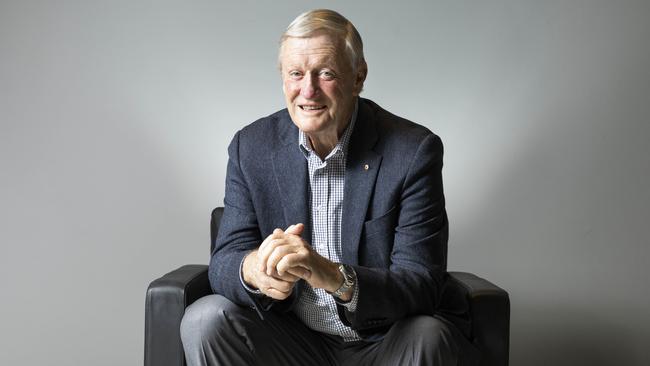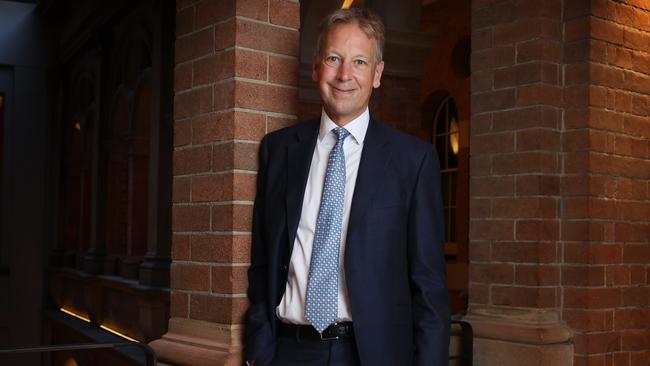Ex-Rio boss Leigh Clifford says outgoing CEO Jakob Stausholm leaving firm in ‘excellent’ shape
Veteran Rio Tinto executive Leigh Clifford has praised the performance of outgoing CEO Jakob Stausholm, saying he is leaving the mining giant with an excellent set of assets.

Former Rio Tinto boss Leigh Clifford has backed Jakob Stausholm’s $10bn bet on a major expansion into lithium, but refused to be drawn on the reasons behind the ousted chief executive’s exit from the company.
Mr Clifford, who served as Rio Tinto chief executive from 2000 to 2007, praised the performance of Mr Stausholm, saying the mining giant now had an excellent set of assets to deal with rising challenges across the sector.
Mr Stausholm also had done a very good job in focusing on some of the “cultural issues” over the past five years at the company, whose global assets span iron ore, copper and lithium, he said.
“He’s very admired by the employees and restored the esprit de corps of the organisation,” said Mr Clifford.
“As a shareholder, I welcome their considerable diversification.”
Rio Tinto last year announced it would buy Arcadium Lithium in a near $10bn bet on the future of the critical battery material that continues to be hit by a global price slump.
At the time Mr Stausholm said the deal, which makes the miner one of the world’s biggest lithium producers, was a “risk worth taking” and a significant step in its long-term strategy to create a world-class business needed for the energy transition.
However, prices for the commodity have not recovered to match Mr Stausholm’s enthusiasm.
Rio’s core iron ore business at the same time also is facing challenges. It will have to open a new iron ore mine in the Pilbara region of Western Australia every year until 2030.
It will also have to maintain production while battling inferior quality at the business, which still provides the lion’s share of its earnings, and is expected to fund expansion of its copper and lithium projects.

Mr Clifford said there were positive signs for Rio’s giant Oyu Tolgoi copper mine in Mongolia along with its iron ore joint venture with Mitsui & Co.
He said he did not know the reasons behind Mr Stausholm’s departure and declined to be drawn into reports it resulted from friction with Rio chair Dominic Barton.
“I have no idea what might happen next with the CEO search, but the board will do a very thorough search,” he said.
Perth-based iron ore boss Simon Trott is considered a frontrunner to replace Mr Stausholm, along with Newmont Corporation chief executive Tom Palmer. Rio chief commercial officer Bold Baatar is also a favourite.
Rio Tinto’s increasing focus on diversification has been distracted by accusations of bullying and racism across its various mining sites.
A workplace culture audit by former Sex Discrimination Commissioner Elizabeth Broderick commissioned by Mr Stausholm found one-in-three workers had experienced some form of bullying; some 16 per cent of women had been subject to sexual harassment; and racism was prevalent. More than 26 recommendations came out of the report, forming the Everyday Respect program. Rio also spent hundreds of millions of dollars upgrading security and facilities across its remote operations to make its workplaces safer for everyone. It also invested heavily in training and education right down the line, all while driving the message home to 57,000 staff and contractors about what was acceptable behaviour.
AustralianSuper, a major Rio shareholder, commended the work Mr Stausholm had done recalibrating the company’s culture and values and his commitment to change and transparency.
“He leaves the business on a strong footing with the prospect of renewed growth which we anticipate will add long-term value for shareholders,” AustralianSuper said.
BHP has its own succession race under way, although under new chairman Ross McEwan the process will be much smoother. Mike Henry, who was appointed CEO at the start of 2020, is widely expected to flag his retirement within the next year, to also be replaced by an internal candidate.
Rio shareholder Platypus Asset Management says that for the sake of consistency of business strategy, outside talent should not be chosen over an internal candidate at Rio.
“Clearly a strong internal candidate is the preference, and continuation of the business strategy,” Platypus portfolio manager Stephen Butel said.
“I don’t think you’d want an outside candidate coming in and resetting or looking to grow by large inorganic acquisitions. More evolution than revolution would be what we’re looking for in a candidate.”
Mr Stausholm’s successor will also face other internal challenges, including debate about whether the company should keep its dual listing in both London and Australia.
London-based hedge fund Palliser Capital lost a fight for Rio to abandon its UK listing at the start of May. However, a new CEO may hand its campaign fresh impetus. Palliser argued unification would free up capital for shareholders and subsequently unlock a better valuation.
Additional reporting: Eric Johnston, Perry Williams and Brad Thompson




To join the conversation, please log in. Don't have an account? Register
Join the conversation, you are commenting as Logout